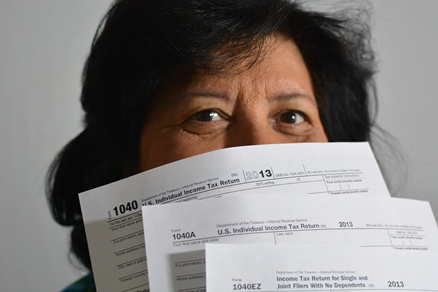
26 U.S.C. §61(a)(12) states “gross income means all income from whatever source derived, including… [i]ncome from discharge of indebtedness.” This means that when you have debt that is forgiven or discharged for less than the full amount owed, then you must claim as ORDINARY INCOME the amount you didn’t have to repay. As a result, you have to pay taxes on the cancelled amount.
The Internal Revenue Service will likely notice the forgiven debt because of the reporting requirements on creditors. If a financial institution, federal agency or credit union cancels or forgives debt of $600.00 or more, you will receive a Form 1099-C, Cancellation of Debt and it will also be reported to the IRS by January 31st of the following year. Even if the creditor is not required to issue Form 1099-C, the taxpayer is nevertheless obligated to report forgiven debt income to the IRS and pay the necessary taxes. Failing to report income from cancelled and forgiven debt can lead to interest and penalties due.
What if your debt was secured by property (for example, a residential home encumbered by a mortgage)? What if this property falls into foreclosure and the creditor takes the property in full or partial satisfaction of the debt? What are the tax consequences?
The amount of income you must report depends on whether you had a recourse debt (you are personally liable for the debt) or a nonrecourse debt (you are NOT personally liable for the debt. A creditor taking the property to satisfy debt is treated as if the property was sold. If the property was subject to a recourse debt, then the amount of income to report is the amount of the debt forgiven IN EXCESS of the fair market value of the property. If the property was subject to a nonrecourse debt, then you DO NOT report ordinary income from the cancellation of debt but you may recognize other gain or loss depending on the nature of the property.
There are circumstances where cancelled or forgiven debt is not reported as income:
- GIFTS AND BEQUESTS – You do not have income from debt cancelled as a gift, bequest, devise or inheritance.
- STUDENT LOANS – Certain student loans from attending a qualified educational institution that are cancelled or forgiven for working a certain period of time in certain professions is not income. For example, a law school graduate willing to practice as an attorney for a period of time in non-profit businesses or sparsely populated areas may be eligible for debt cancellation. The Tax Cuts and Jobs Act of 2017 added a provision allowing for a student loan discharged by the death or total disability of the borrower to not be included as income if discharged between tax years 2018 and 2025.
- DEDUCTIBLE DEBT – You do not have income from cancelled debt if the payment of the debt would have been tax deductible (but only if you use the cash method of accounting).
- PRICE REDUCED AFTER PURCHASE – If the seller reduces the amount of debt you owe for property already purchased, you generally do not have income from the reduction (however, the reduction reduces your basis in the property).
- STOCKHOLDER DEBT – If you are a stockholder in a corporation and the corporation forgives you debt to it, the cancelled debt is considered a constructive distribution that may be taxed at capital gains rates instead of ordinary rates.
- HOME AFFORDABLE MODIFICATION PROGRAM (HAMP) – Pay-for-Performance Success Payments that reduce the principal balance of your home mortgage under HAMP are generally not taxable. However, reduction of the principal balance under HAMP’s Principal Reduction Alternative may be taxable as cancelled debt.
There are classes of cancelled or forgiven debt that is excluded from gross income reporting:
- The debt is cancelled in a bankruptcy case filed under Chapter 11.
- The debt is cancelled due to your insolvency.
- The debt is a qualified farm debt and is cancelled by a qualified person.
- The debt cancelled is qualified real property business indebtedness.
- The debt cancelled is qualified principal residence indebtedness (if the debt is discharged after 2015, the discharge is subject to proof in writing of the loan arrangement executed prior to January 1st, 2017).
It is not always legally clear what types of cancelled or forgiven debt are reportable as income. If the creditor issued a Form 1099-C but still makes efforts to collect on the debt, then you may not actually have cancelled debt income. It is also possible that the creditor reported erroneous information on Form 1099-C to the IRS that requires correction. A good-faith disputed debt may also be excludable from reporting. Finally, if you discovered that you overpaid taxes in previous years due to mistakenly reported income from cancelled debt, then you may be able to make a claim for refund up to three years from the date the tax return was due (e.g. if your return was due on April 18th, 2016, then you may claim a refund for that tax year by April 18th, 2019).
Making wrong assumptions about your discharged debt under the tax law can cost you thousands of dollars. If you have questions about the tax treatment of cancelled and forgiven debt, do not hesitate to contact the tax professionals at Kershaw, Vititoe & Jedinak PLC.





